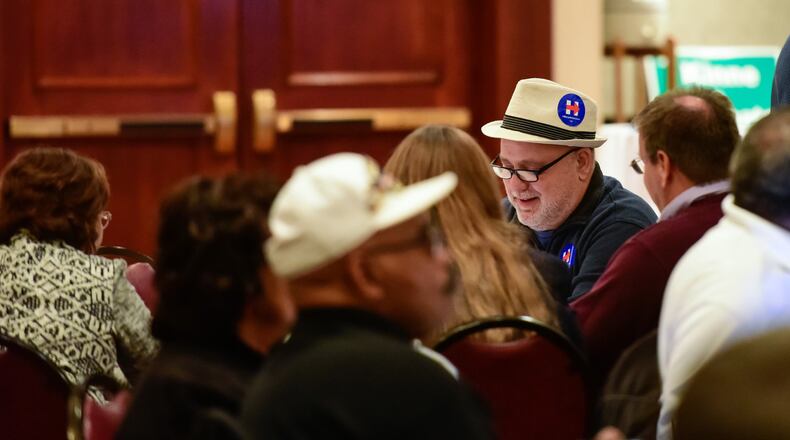Some 40 years after that political change, Democrats are hoping to make Butler County blue again, though party leaders know that could take years to happen.
RELATED: Butler County Democratic Party endorses 4
That starts with “building the bench,” where local-level nonpartisan offices are occupied by Democrats, said Kathy Wyenandt, the party’s Central Committee chairwoman.
“It’s really something to overcome, but there’s some opportunities these days,” she said. “We’re seeing some change, but it doesn’t mean it’s easy.”
Wyenandt said there are residents who have made inquiries about running for office, and becoming involved. That includes people like Sha’quila Mathews, who is seeking election to Hamilton City Council, and Jacob Bruggeman, who is seeking a seat on Oxford City Council. Both are endorsed by the party.
Mathews, who is best known as Pastor Shaq around Hamilton, believes it’s important for people with diverse backgrounds to be a part of balanced decision-making in communities “because it’s about what’s right and what’s fair, and giving everybody the opportunity to living the best life possible.”
“We definitely need another perspective to balance the powers that be out,” said the 37-year-old pastor of Truth and Life Community Church on Front Street. “When people feel like they don’t have the opportunity to provide for themselves … I think it can lead to crime, I think it can lead to depression, I think it can lead to not having hope.”
For 20-year-old Jacob Bruggeman, a junior at Miami University in Oxford, he believes winning for Democrats means changing perspectives, or at least softening them, by engaging more with residents. Of the more than 248,000 registered Butler County voters, more than 147,700, or 60 percent, are not affiliated with a party.
“I think the best thing to do with the Democrats is to engage with the community, and to persuade people that disagree with them,” said the history and political science double major.
The swing in the county’s political leanings 40 years ago also matches with the population growth of the county, and the growth of some of the strongest Republican communities in Butler County.
As the county started to switch from blue to red, a growth explosion was about to happen in West Chester and Liberty townships, and the city of Fairfield was barely a teenager. Today, these three communities are three of the five largest in the county.
RELATED: Carlos Todd influenced politics, business in Butler County
Liberty Twp. has seen more than 1,000 percent growth since 1960, and West Chester Twp. has seen nearly 900 percent growth from that time. The city of Fairfield, which incorporated in September 1955, has grown by more than 335 percent from the 1960 census.
Today, there are nearly three registered Republican voters (74,229) for every one registered Democratic voter (26,062).
There hasn’t been a Democrat to hold a countywide partisan office since the death of former Butler County prosecutor John F. Holcomb, who died in office in July 2000. He was in that position for 27 years.
The only countywide officeholder the Democrats today can tout is Butler County Juvenile Court Judge Kathleen Romans, though Ohio judgeships are nonpartisan seats.
The Democratic Party’s bottom-up approach to take back some of the GOP’s political power is exactly what they need to focus on, said Miami University Regionals political science professor John Forren. That includes convincing strong, viable candidates to run, helping those candidates navigate the political ropes, and making sure they have the resources to mount a competitive campaign.
“That’s how you build the bench. There’s really no other way to do it,” Forren said.
However, he said the party has “a chicken and the egg problem.” It has to have a viable presence in the county before it can build a stronger presence in the county, but in order to build a stronger presence it has to be seen as viable.
Every election in the past 15 years Democrats in partisan countywide races get easily beat. But that’s why local races are important, Wyenandt said. They’re nonpartisan and it shouldn’t matter a candidate’s political affiliation.
“Your partisanship shouldn’t really matter (at the local level) because most people can agree on the same things,” Wyenandt said.
That’s not going to be easy for the Democrats, said Butler County Republican Party Executive Chairman Todd Hall. Butler County has been, and will be for the foreseeable future, aligned with conservative and Republican values, he said.
“The Republican Party is focused on running solid conservative and fiscally responsible candidates that best represent the constituents of Butler County,” said Hall, grandson of the GOP chairman who led the party to its initial political dominance in the 1990s and 2000s.
“Opposition at the ballot box and in the public forum is healthy for democracy, but our local GOP remains confident in our conservative ideals, candidates and officeholders.”
But if this believed momentum on the national stage — Democrats hoped to win the Georgia special congressional election, but lost that as well as Kansas, Montana and South Carolina special elections — translates to the county level, they can regain some of the political power Republicans now have locked down.
“People pay attention to what’s happening nationally, and whether we like it or not it trickles down to what’s happening here and sort of influences people,” Wyenandt said. “We’ve tried to get ahead of a lot of things and create our own message, and create our own activity here, but I think it’s really finding really strong people with their own networks – kind of built-in support and people who are courageous enough to say I’m a Democrat and get out there.”
About the Author

